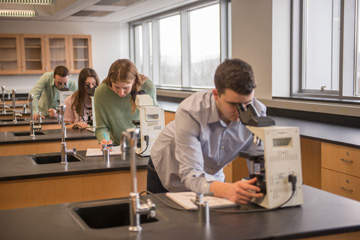
10/30/2015
The prestigious math teaching scholarship Gauri Kolhatkar M.A.T. ’12 received to pursue her master’s degree from SUNY Cortland offered more than financial assistance. For Kolhatkar, a native of India whose first career was in mechanical engineering, the College’s Noyce Scholarship Program provided a major vote of reassurance that she could succeed in a new field.
“It gave me confidence,” said Kolhatkar, who lives in Ithaca, N.Y., and teaches math at Newfield High School. “This was my second career and English was my second language, so I was nervous. The scholarship not only gave me the funds, but the belief that I could teach.”
SUNY Cortland recently learned that it will receive nearly $800,000 to assist promising science, technology, engineering and mathematics (STEM) majors and professionals like Kolhatkar to become K-12 educators in high-need school districts. It’s the second phase of funding the College has earned through the National Science Foundation’s Robert Noyce Teacher Scholarship Program.
“This is truly wonderful news, both for our deserving future teachers and for the districts that will one day benefit from their teaching,” College President Erik J. Bitterbaum said. “We need great teachers in STEM disciplines at all grade levels: teachers who enter the classroom with both a depth of knowledge in their content areas and the ability to pass that knowledge on to students.
“This award further supports SUNY Cortland’s reputation as one of the region’s most respected teaching colleges, especially in the STEM fields.”
Over a five-year period, the College will award 38 scholarships — 28 to junior or senior undergraduates worth $11,500 each and 10 at the graduate level for $14,000 — to students pursuing biology, chemistry, geology, physics and mathematics. The funding, which totals $799,855, also will be used to establish a first-year learning community for future STEM educators and to research teaching outcomes after program participants graduate.
Noyce Scholars make a post-graduation commitment to teach in districts with high-need schools across New York state. College partners include: Binghamton, Cincinnatus, Cortland, Dryden, Homer, Marathon, McGraw, South Seneca and Tully. The overall goal is to create a continuous pipeline of highly trained STEM educators to teach in the districts that need them the most.
“This program involves the hard work of a lot of different people from across campus,” said Gregory Phelan, professor and chair of the College’s Chemistry Department as well as the principal investigator for the grant, named after the co-inventor of the microchip.
SUNY Cortland’s Noyce Scholarship application committee also included Noelle Chaddock, chief diversity officer; Kerri Freese, the Noyce Scholarship Program coordinator; Mary Gfeller, associate professor of mathematics; Rena Janke, associate professor of biological sciences; and Angela Pagano, assistant dean for accreditation in the School of Education, in addition to support from the SUNY Urban Teacher Education Center.
“There are many students in our classes who aren’t going to be scientists but who need to be just as scientifically literate,” Phelan said. “We try to put an emphasis on using innovative teaching strategies — getting away from the traditional lecture in the sense that professors stand in front of a classroom and profess knowledge to students. We spend more time doing inquiry-based activities, both in laboratories and lectures.”
Kolhatkar said she likely would not have considered SUNY Cortland if not for the Noyce Scholarship Program. In 2010, when the College received its first phase of Noyce funding, she already held a master’s degree in mechanical engineering from Cornell. A former classroom volunteer in India and substitute teacher in Ithaca, she was looking for a rewarding way to navigate a career change in her early 40s.
“I liked the idea of doing something worthwhile with my time,” said Kolhatkar, who travels overseas to India each summer to work with children who are hearing impaired or blind. “I couldn’t believe someone was willing to pay me to talk about math and science.”
She also benefitted from networking with other Noyce Scholars at the program’s national conference in Washington, D.C., she said. The Noyce Teacher Scholarship Program supports roughly 300 programs across the country.
“Noyce Scholars want to learn more about their content areas,” said Phelan, who now has been awarded more than $3 million in grant funding for various projects since arriving at SUNY Cortland in 2009. “They have that spark and that desire to help others understand difficult concepts.”
In addition to making a teaching commitment to a school in a high-need area, future recipients will participate in small-group activities such as campus workshops, seminars and book talks with highly effective New York State Master Teachers. These aim to provide a casual, out-of-classroom environment to discuss best teaching practices in high-need schools.
The acceptance rate of scholarship applicants was roughly 40 percent during the College’s initial round of Noyce funding, which awarded 54 scholarships during a five-year span from 2009 to 2014. The number of scholarships will be slightly less during the second phase to devote proper funding to study the impact of immersion practices such as specialized classes, field experience and professional development. Pagano and Gfeller, who created an innovative Clinically Rich Teacher Preparation Pilot Program in 2013-14, will lead the longitudinal study.
For more information about SUNY Cortland’s Noyce Scholarship, including its application process, visit cortland.edu/noyce or contact Freese at [email protected] or 607-753-2913.